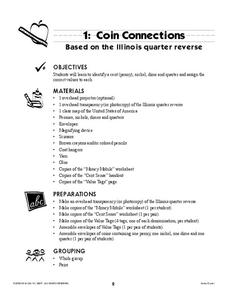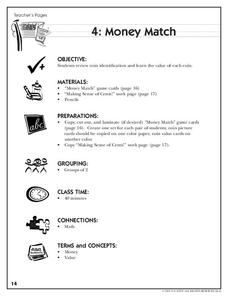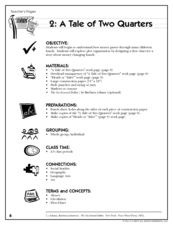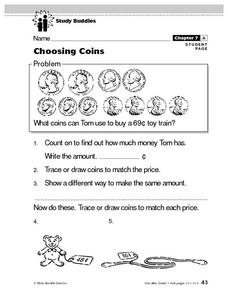Curated OER
Simple Strategies
Here is a fabulous lesson plan on problem solving strategies for your charges. In it, learners are presented with many excellent techniques they can use when faced with a multi-step math word problem. Some terrific blackline masters are...
Curated OER
Musical Change
Young learners record observations about different coin denominations and create a song about coins to the traditional song, "The Wheels on the Bus." This lesson is based on the Tennessee Quarter Reverse, and has all sorts of excellent...
Curated OER
Alexander Used to Be Rich
Reading Alexander, Who Used to Be Rich Last Sunday, launches this lesson appropriate for children who recognize coins and have been introduced to coin values. Using addition and subtraction skills, the class tracks Alexander’s spending...
Curated OER
Casting Coins
This wonderful art lesson invites learners to design and “mint” coins bearing their own symbols. A simple carving andcasting process using Blick Wonder-Cut®linoleum and modeling clay is described in the plan. Coins can be one or 2-sided,...
Curated OER
Quarter, Nickel, Dime....
An engaging game called, "Quarter, Nickel, and Dime" is presented in this math lesson. Players are given an envelope with slips of paper that represent the three coins. In pairs, they play the game 18 times, and the whole class charts...
Curated OER
Coin Connections
A wonderful lesson on identifying the penny, nickel, dime, and quarter awaits your young mathematicians. They engage in a multi-session lesson which allows them to practice using the values of each coin in worksheets and activities...
Curated OER
Let's Make A Deal
Third graders make a picture money book. In this money lesson, 3rd graders read The Monster Money Book, discuss money terminology, watch a video on money and draw an example of the barter system. Students use the Internet to find...
Curated OER
Money Math
Is there a better, and more motivating, math manipulative than money? Kids love to use it, and it's a great teaching tool. Here, there are three good activities using coins. Learners create patterns, sort change, and have a...
Curated OER
What's in Your Piggy Bank?
Fill up your piggy banks! First graders find different ways to fill up cute piggy banks with 30 cents. Will they use two dimes and two nickels? Or a quarter and five pennies? Use this activity with groups to reinforce your money math...
Curated OER
International Currency Exchange
Students examine coins from around the world and write down their observations. As a class, they discuss the types of symbols used on the coins from different countries and locate the country on a map. To end the lesson, they calculate...
Curated OER
Adding Coins
Here's a great way to get scholars drawing out math problems. This money math learning exercise gives them five coins to start with. They find as many combinations of three as they can to create different totals. Two examples are given...
Curated OER
Probability
Here is a fine presentation on probability, and the language of probability. Pupils are introduced to the words, impossible, unlikely, likely, and certain. Then, they consider a variety of events, and assign one of the words to describe...
Curated OER
Math Cross, Puzzle #26
Here is a measurement, money and time worksheet which invites learners to solve twenty-eight math problems utilizing addition, subtraction and multiplication strategies to complete a math crossword puzzle.
Curated OER
The Value of Coins
How much is a penny, nickel, dime, and quarter worth? Learners count and make various coin variations that equal a given denomination. Each slide contains images and explanations on how one should count coins to add them up.
Curated OER
How Much is it Worth?
Money makes everything a little more fun for your mathematicians! Show them how they can implement their addition skills in the real world using this worksheet. Scholars examine six sets of coins, which are photographed. They include...
Curated OER
Close Observation: Coins
Integrate math, science, and speaking/listening with a collaborative hands-on activity. Each group works with a single penny, examining it with the naked eye and recording observations. Repeat using magnifying glasses. Then repeat with a...
Curated OER
A Mass of Pennies
Learners estimate and determine the number of cents (pennies) that are needed to equal the mass of a variety of common objects. They develop a process for measuring and explore concepts related to units of measurement.
Curated OER
Stamping Coins
Learners demonstrate that they can use a variety of coin combinations to make a single amount. They study all the ways to make 50 cents using coins using different coins.
Curated OER
Money Match
Playing a game can be educational, pupils use this matching activity to identify coins and their values. This is a great way to have learners practice their money sense.
Curated OER
Trading Faces
The game of "Trading Faces" is the focus of this clever math lesson. Your mathematicians use addition to determine the values of different coin combinations by playing the game. Everything you need to implement the game, and the lesson,...
Curated OER
A Tale of Two Quarters
Have your class use the life of a quarter to understand and design plot and flow charts. They read the book, The Go-Around Dollar, think about how their teacher got her quarters that day, then create a flow chart. They have to show how...
Curated OER
The Coin and the Fable: Alaska quarter reverse
An Alaskan quarter and a book of fables is what you'll need to start this lesson. Learners will use the image of the bear and the salmon found on the reverse side of the Alaskan quarter as inspiration. They will compose a fable about the...
Curated OER
It's in Your Pocket
Students examine American coins. In this American currency lesson, students study how American money came to be as well as the responsibilities of the U.S. Mint. Students discover details regarding American coins and design their own coins.
Curated OER
Choosing Coins
In this mathematics worksheet, 1st graders identify what coins can be used to buy a toy train. Then they count out how much money is given and write that amount in cents. Students also trace or draw the coins to match each price listed.

























